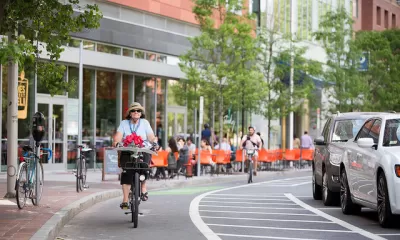A major zoning amendment was approved by the Cambridge City Council on Monday, October 24, 2022.

The City Council in Cambridge, Massachusetts voted, 8-1, to eliminate parking requirements citywide yesterday. The council vote amends the city's zoning ordinance by eliminating all minimum parking requirements in the city.
The city, location of multiple universities with top ranked planning programs, becomes the first in Massachusetts to enact such a complete parking reform, reports Elias J. Schisgall for the Crimson. According to the article, the council cited "declining car ownership and the need for more open space and housing construction" as the reasons for the significant policy reform.
The council's sole dissenting vote, Councilor Dennis J. Carlone, is quoted in the article saying that the zoning code amendment would not have the desired effect of reducing traffic, and that the real problem with parking requirements in the city is the use of parking maximums.
The parking reform is the latest example of innovative zoning practices in the city of Cambridge. In 2020, the city also adopted an affordable housing overlay, which allows affordable housing developments with bonus height and density in residential neighborhoods throughout the city, while also streamlining the development approval process for affordable housing projects.
Cambridge is the latest in a string of cities and states to adopt sweeping changes to parking requirements. The state of California most recently enacted statewide parking reforms, in August removing parking requirements for developments near transit stops, following the state of Oregon, which adopted the "Climate-Friendly and Equitable Communities" rule earlier in the summer. Cincinnati eliminated parking requirements in some of the city this year, while Ann Arbor eliminated parking requirements throughout that city. Dallas and Richmond, Virginia are currently considering parking reform.
[Update: Additional coverage of Cambridge's parking reform is available behind the paywall at the Boston Globe.]
FULL STORY: Cambridge Becomes First Massachusetts City to Fully Abolish Parking Minimums

Trump Administration Could Effectively End Housing Voucher Program
Federal officials are eyeing major cuts to the Section 8 program that helps millions of low-income households pay rent.

Planetizen Federal Action Tracker
A weekly monitor of how Trump’s orders and actions are impacting planners and planning in America.

Ken Jennings Launches Transit Web Series
The Jeopardy champ wants you to ride public transit.

Driving Equity and Clean Air: California Invests in Greener School Transportation
California has awarded $500 million to fund 1,000 zero-emission school buses and chargers for educational agencies as part of its effort to reduce pollution, improve student health, and accelerate the transition to clean transportation.

Congress Moves to End Reconnecting Communities and Related Grants
The House Transportation and Infrastructure Committee moved to rescind funding for the Neighborhood Equity and Access program, which funds highway removals, freeway caps, transit projects, pedestrian infrastructure, and more.

From Throughway to Public Space: Taking Back the American Street
How the Covid-19 pandemic taught us new ways to reclaim city streets from cars.
Urban Design for Planners 1: Software Tools
This six-course series explores essential urban design concepts using open source software and equips planners with the tools they need to participate fully in the urban design process.
Planning for Universal Design
Learn the tools for implementing Universal Design in planning regulations.
Heyer Gruel & Associates PA
Ada County Highway District
Institute for Housing and Urban Development Studies (IHS)
City of Grandview
Harvard GSD Executive Education
Toledo-Lucas County Plan Commissions
Salt Lake City
NYU Wagner Graduate School of Public Service





























